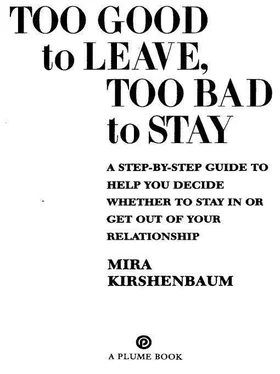Kirshenbaum, Mira - Too Good to Leave, Too Bad to Stay
Здесь есть возможность читать онлайн «Kirshenbaum, Mira - Too Good to Leave, Too Bad to Stay» весь текст электронной книги совершенно бесплатно (целиком полную версию без сокращений). В некоторых случаях можно слушать аудио, скачать через торрент в формате fb2 и присутствует краткое содержание. Жанр: Психология. Описание произведения, (предисловие) а так же отзывы посетителей доступны на портале библиотеки ЛибКат.
- Название:Too Good to Leave, Too Bad to Stay
- Автор:
- Жанр:
- Год:неизвестен
- ISBN:нет данных
- Рейтинг книги:3 / 5. Голосов: 1
-
Избранное:Добавить в избранное
- Отзывы:
-
Ваша оценка:
- 60
- 1
- 2
- 3
- 4
- 5
Too Good to Leave, Too Bad to Stay: краткое содержание, описание и аннотация
Предлагаем к чтению аннотацию, описание, краткое содержание или предисловие (зависит от того, что написал сам автор книги «Too Good to Leave, Too Bad to Stay»). Если вы не нашли необходимую информацию о книге — напишите в комментариях, мы постараемся отыскать её.
Too Good to Leave, Too Bad to Stay — читать онлайн бесплатно полную книгу (весь текст) целиком
Ниже представлен текст книги, разбитый по страницам. Система сохранения места последней прочитанной страницы, позволяет с удобством читать онлайн бесплатно книгу «Too Good to Leave, Too Bad to Stay», без необходимости каждый раз заново искать на чём Вы остановились. Поставьте закладку, и сможете в любой момент перейти на страницу, на которой закончили чтение.
Интервал:
Закладка:
What this guideline really says to you is put up or shut up. Look at what you need to be happy in life. Look at what you’re doing to get those needs satisfied. If those needs are so important that they’ll make all the difference between your being happy in life or not, then either you’ve got to find a way to get them satisfied in the relationship—and that means learning to negotiate and get whatever other help you need—or you owe it to yourself and your partner to leave the relationship. Otherwise years later you’ll find yourself living with someone you hate.
But if those needs are not so all-determining of your future happiness, then work at getting them met by all means, but stop thinking of them as a reason to leave.
Unmet needs are one of the main causes of people being stuck in ambivalence. So face your big needs. See the difference it will make to your happiness if you don’t get them met. The guideline is clear. And if you’re unsure whether not getting this need met will make your life unsatisfying, then it’s not a big enough need to end a relationship over. If not getting it met will clearly make your life unsatisfying, you’re just condemning yourself and your partner to misery if you do stay.
17
Love To Love You, Baby
Issue: Intimacy—How It Feels to Be Close
Close is what you look for in a relationship. But close is what you’ve probably found it’s hard to get. Close is where you feel good. But close is where you get hurt. This is the promise and problem of intimacy. Let me help you sort all this out.
But it’s getting late, isn’t it? Here we are, near the end of our diagnostic journey, and if you still haven’t gotten the clarity you were looking for, you might be getting nervous, or you might be wondering what’s wrong with you.
Don’t worry. Even though many people have found the clarity they were looking for by this point, if you haven’t yet, there’s most likely nothing wrong with you.
The reason you still haven’t seen what’s best for you to do could be that you simply won’t find that any diagnostic question points in the direction of your leaving. Not one. And I don’t want to give away the punch line, but you’ll soon see that if nothing points to leaving, then that points to the fact that you’ll be happiest if you stay.
It’s like when you go to the doctor: if there’s nothing wrong that means everything’s okay. Not necessarily great. But okay. And that’s the kind of clarity you were looking for.
But the reason you haven’t found your clarity yet could also be lurking in the complicated area we’re about to get into. It’s the area where we’ll explore how it feels when you and your partner are together, when the two of you get closer and closer to one another. Feeling good and getting close, feeling good because you’re getting close, is the essence of what it means to be in a relationship.
But you know why this area is so complicated: You know how hard it is to get close. You know how it’s only when you get close that you see how much closer you can get. You know what a cruel, discouraging yardstick it is to apply closeness as the measure of success in a relationship.
If having trouble with intimacy were the cutoff point, we’d all be kicked out of our relationships. So where is the cutoff point? What we’ll look at in this chapter is where intimacy hurts, where intimacy doesn’t happen, and what makes intimacy special.
STEP #32: WHEN YOU GET CLOSE, YOU GET HURT
When we talk about getting intimate we talk about being vulnerable. Vulnerable literally means “able to be wounded.” But what is it exactly about the wounds we incur when we’re most woundable that makes some relationships too bad to stay in?
Let’s talk about what it means to get close. It means that you show parts of yourself to the other person that you don’t show anyone else. And they like what you show them and they like you for showing it. And they let you know that they like it. And then, so that you won’t feel stupid hanging out there more psychologically naked than they are, they show parts of themselves to you that they don’t show anyone else. And you show them that you like what they’ve shown you and that you like them for showing it.
Let’s call this “mutually appreciative escalating nakedness.” And of course it can be nakedness of any kind, physical, psychological, emotional. And while the two of you are getting naked like this and appreciating each other for it, you not only appreciate each other for what you’ve disclosed but also for the fact that you have disclosed something special between you. And that’s where the problems start to come in.
As long as you keep telling each other how wonderful you are with every disclosure—well, you certainly feel appreciated, but you wonder if you’ve been seen at all. So that you know you’ve really been seen you need to tell each other a special truth that no one else can tell you. For example, if one of you tells the other something about what it was like for you growing up, and you’ve disclosed something really personal, you’ll know the other has seen your. nakedness if they say something about what you told them that no one else would say. Such as, “You’ve talked a lot about stuff people in your family did to you, but it seems to me that you relished a lot of it and used it as a weapon against them.”
And you’re hungry to hear that truth until you actually do hear it. Then you aren’t quite as happy as you were before. Sure, you’ve been seen all right, but you’re not hearing such nice things. And you don’t like hearing such not-nice things, especially when you’ve taken the risk of getting naked. So you feel rejected instead of appreciated. And then there’s a big fight.
Does any of this sound familiar?
And so two people while experiencing mutually escalating nakedness keep bumping into each other like two unrehearsed ball-room dancers stepping on each other’s toes.
You’re Beautiful When You’re Naked
But there’s a way of managing this successfully in spite of all the places where we keep stubbing our toes. This is when you manage to convey to each other that—even though you say critical, even rejecting, things, even though you get angry at what your partner reveals in her nakedness, even though your partner gets angry with you for getting angry at what she revealed in her nakedness—you still basically think the other is pretty terrific. That way, even though feelings get hurt, the stage of intimacy doesn’t become a place of horror.
But when does it become a place of horror? When does intimacy turn from being a place where feelings occasionally get hurt to being the one place in the world where you feel least at home? Here’s the question:
Diagnostic question #32. Given the way your partner acts, does it feel as though in getting close to you what he’s most interested in is subjecting you to his anger and criticism?
You know how it is. Some people really seem to want to get close so they can get close. Some people want to get close so they can complain about their lives to you. Some people want to get close so they can have sex. And some people seem to want to get close just so they can hurt you.
Here’s an example of what this is like so that you can see if question #32 applies to you.
Theresa’s Story
Theresa admired Paul before she loved him. Then she fell in love with him because of how much she admired him. Paul was a psychiatrist unusual for his devotion to working with the poorest, most disturbed people in the community. As someone who worked in a funding agency and was frustrated with trying to help people from behind a wall of ledgers, Theresa saw Paul as a hero.
Читать дальшеИнтервал:
Закладка:
Похожие книги на «Too Good to Leave, Too Bad to Stay»
Представляем Вашему вниманию похожие книги на «Too Good to Leave, Too Bad to Stay» списком для выбора. Мы отобрали схожую по названию и смыслу литературу в надежде предоставить читателям больше вариантов отыскать новые, интересные, ещё непрочитанные произведения.
Обсуждение, отзывы о книге «Too Good to Leave, Too Bad to Stay» и просто собственные мнения читателей. Оставьте ваши комментарии, напишите, что Вы думаете о произведении, его смысле или главных героях. Укажите что конкретно понравилось, а что нет, и почему Вы так считаете.












